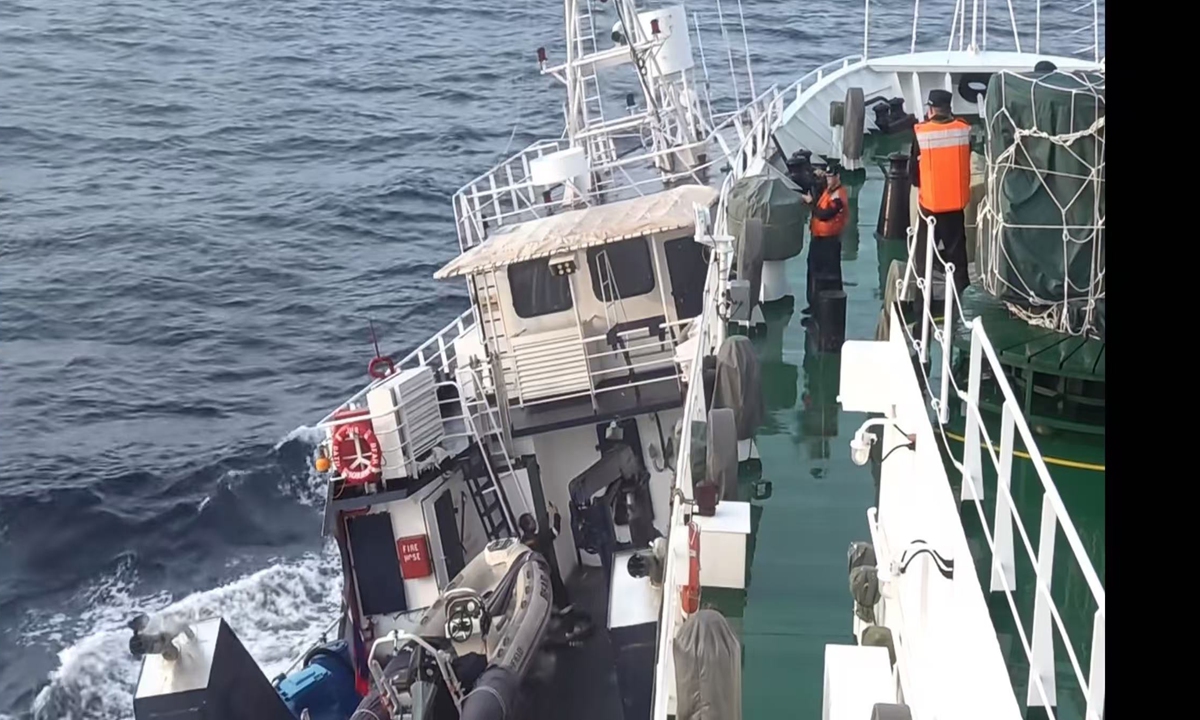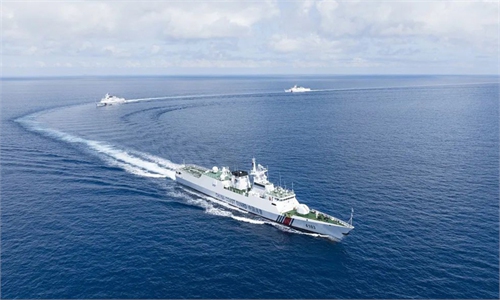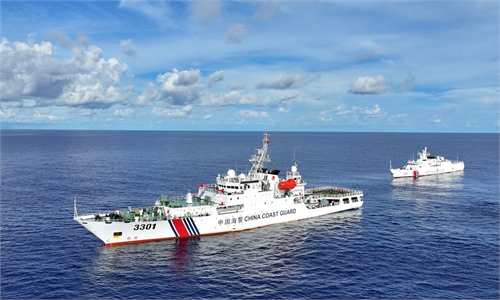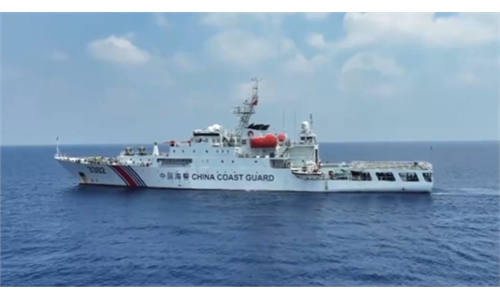'True provocateur and violator'- Filipino ship deliberately rams into CCG ship near Huangyan Dao as China implements control measures
Water cannon fire in territorial waters of Huangyan restrained move: expert

While intruding into the territorial waters of China's Huangyan Dao, Philippine government vessel 3003 dangerously approaches China Coast Guard ship 3302 and causes a collision at 7:04 am on December 4, 2024. Photo: Screenshot from China Coast Guard's WeChat account
China implemented control measures against Philippine ships that attempted to intrude into the territorial waters of China's Huangyan Dao on Wednesday, following China's release of territorial sea baselines for Huangyan Dao last month.
In response to claims by the Philippines regarding the use of water cannons by the China Coast Guard (CCG), Ding Duo, a deputy director of the Institute of Maritime Law and Policy at China's National Institute for South China Sea Studies, told the Global Times on Wednesday that using water cannon to restrict the Philippine vessels' intrusion into Chinese territorial waters should be considered restrained, and should the Philippines insist on going down on the wrong path, China could be forced to take even stronger measures.
Philippine Coast Guard vessels 9701 and 4409, along with government ships 3002 and 3003, attempted to enter China's territorial waters around Huangyan Dao and made unsafe approaches toward CCG vessels conducting routine law enforcement patrols on Wednesday, said CCG spokesperson Liu Dejun in a statement on Wednesday.
In response, the Chinese side took control measures in line with legal and regulatory provisions, Liu said.
Liu then issued a second statement on Wednesday, saying the Philippines dispatched coast guard ships and government vessels, along with several fishing boats, to intrude into China's territorial waters around Huangyan Dao on Wednesday, and the CCG implemented control measures in accordance with the law and regulations.
During the event, Philippine government vessel 3003 disregarded multiple stern warnings from China, made a sharp turn, and reversed, deliberately ramming into CCG ship 3302. This act seriously threatened the CCG vessel's navigational safety, making the Philippines the true provocateur and violator, Liu said.
The Philippine side masqueraded their actions under the pretext of fishing and fisheries protection to carry out rights-infringing and provocative acts, then distorted the facts, blaming China in an attempt to mislead international perception, the spokesperson said.
"We warn the Philippine side to immediately stop its acts of infringement, provocation, and inflammatory rhetoric; otherwise, the Philippines will bear full responsibility for any resulting consequences," Liu said.
Later on Wednesday, the CCG released a video, showing the Philippine government vessel 3003's dangerous approach and collision with the CCG ship 3302.
In response to the water cannon fire, Chinese Foreign Ministry spokesperson Lin Jian said on Wednesday that Huangyan Dao is China's inherent territory, and that it was reasonable, legitimate, professional and restrained for China to take necessary measures to safeguard territorial sovereignty and maritime interests from several Philippine coast guard and government ships attempting to intrude into the territorial waters of Huangyan Dao.
China urges the Philippines to immediately stop infringing provocations and not to challenge China's firm determination in safeguarding its legitimate rights, Lin said.
Jay Tarriela, a Philippine Coast Guard (PCG) spokesperson, claimed on social media X on Wednesday that the Philippine vessels encountered actions from several CCG vessels and Chinese People's Liberation Army (PLA) vessels, including water cannon fires and blocking.
China released baselines of territorial sea adjacent to Huangyan Dao on November 10. A Chinese envoy on Monday deposited to the UN the Statement on the Baselines of the Territorial Sea Adjacent to Huangyan Dao and the Chart, according to the Xinhua News Agency.
Ding said that the CCG remained rational and restrained by using water cannons to block Philippine vessels during maritime law enforcement operations and that the operation adhered to international law and standard practices.
"After the release of the baselines of territorial sea adjacent to Huangyan Dao, our control instruments against Philippine vessels intruding into waters off Huangyan Dao are very rich," Ding said. "If the Philippines insists on going down the wrong path, I believe China's countermeasures will be upgraded and further enhance the intensity of confrontation," he noted.
With the support of external forces, the Philippines continues to provoke China in the South China Sea, primarily to create material to smear China and to maintain heightened attention on the South China Sea issue, Ding said.
With the Philippine's release of so-called "Philippine Maritime Zones Act" and China's release of the baselines of territorial sea adjacent to Huangyan Dao, the Philippines likely wanted to test if China's control measures on islands and reefs in the South China Sea have changed compared to the past, so it attempted to test China's bottom line through provocative actions, Ding said.
Ding said that the Philippines' illegal infringing activities will not significantly disturb the overall situation in the South China Sea, mainly because of China's strong ability to safeguard its rights and its strategic focus, as well as its increasing capability to defend and secure its maritime interests.
"This kind of small winds and wave will not overturn the overall situation of peace and development in the South China Sea," Ding said.




